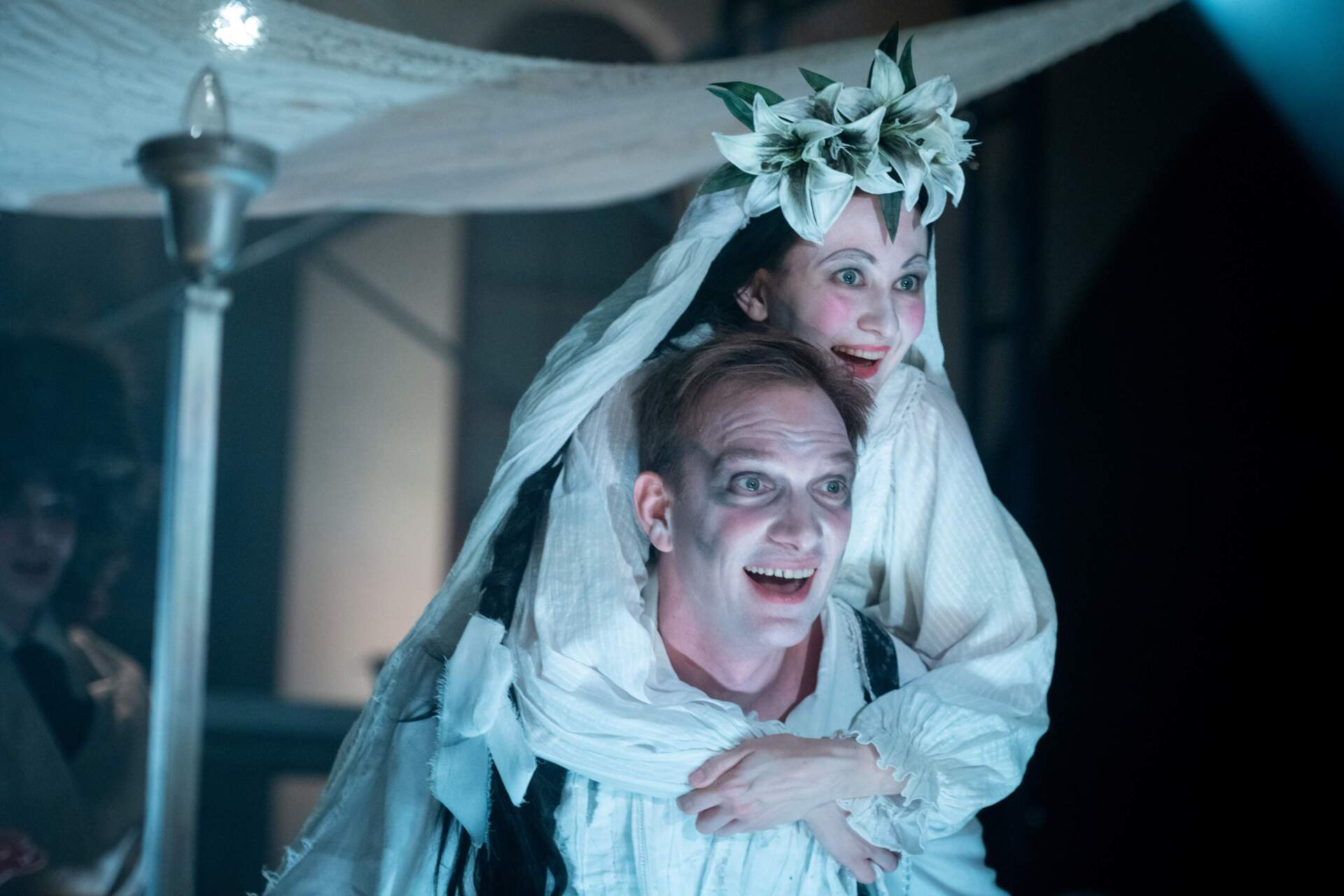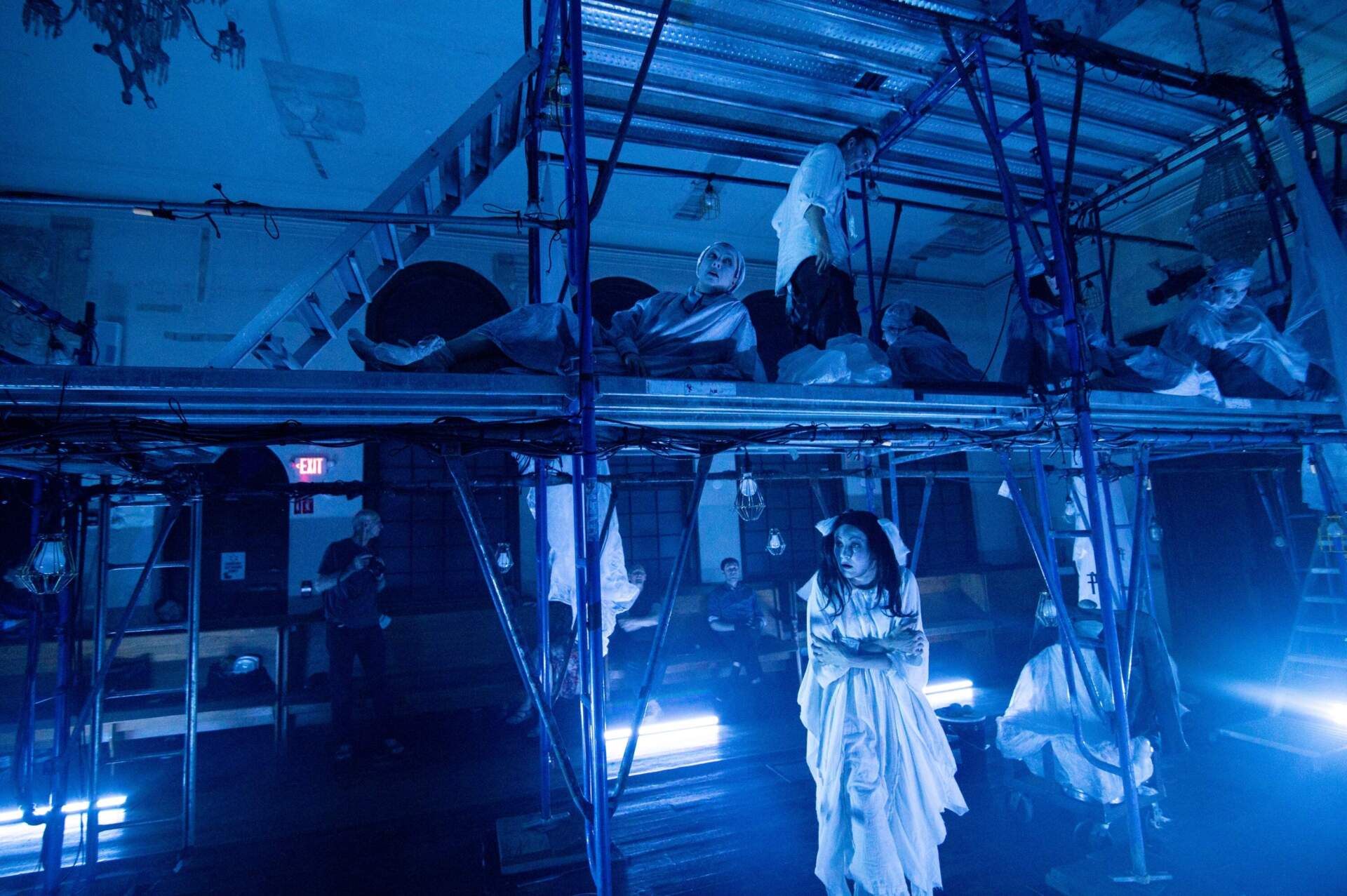Advertisement
Review
Arlekin Players' 'The Dybbuk' is a layered story of star-crossed love

On the surface, "The Dybbuk: Between Two Worlds" is a story of star-crossed love, resilience in the face of loss, broken promises and regret. But in the hands of Arlekin Players Theatre director Igor Golyak, “The Dybbuk” — “a restless spirit” — becomes a layered journey into the space between the past and present, life and death, hope and despair.
Written more than a century ago and popularized by the Yiddish theater movement, “The Dybbuk” was originally written by S. Ansky in 1919, with a new version written by Roy Chen, adapted for this production by Igor Golyak and Rachel Merrill Moss, with additional material from the translation by Joachim Neugroschel.
While dead souls haunting the living and a religious exorcism might not seem like a light-hearted evening in the theater, mysticism meets whimsy in this immersive production now playing at the Vilna Shul on Beacon Hill. The 105-year-old space becomes another character, as its stewards consider what to hold onto and what to let go of as they renovate the historic space. Characters clamber over and around the three-tiered scaffolding that dominates the central playing space; plastic sheeting becomes the wispy barrier between the living and the dead; lighting consists mostly of work lights and strip lighting, and the haze of time wafts over everything.

At the center of the story is Khonen (Andrey Burkovskiy), the restless spirit of the title, who rages against God (“Master of the Universe” as he calls him) for leaving him caught between life and death because of his love for a young woman named Leah (Yana Gladkikh). We learn about his restlessness as he wanders through the scaffolding, clowning and miming as he tries to cling to a bit of reality, watched by a group of spirits praying in a line. We shift to reality as Leah’s father (Robert Walsh) announces her marriage to the wealthy Menashe (Fedor Zhuravlev, who gets a scene-stealing turn as a rock guitar virtuoso trying to impress his bride).
The knowledge that Leah will marry someone else spurs Khonen to action, and although she can’t see him, he reminds her of the spark between them (a lovely and simple technical effect). While she prepares for her wedding with a mikvah (the ritual cleansing bath), he appears to her and reminds her of her love for him. The staging of this is both haunting and hilarious, as those same plastic sheets serve as the water’s surface, and the two lovers bob above the surface and then converse and swim underwater. The possession is completed in the midst of Leah’s marriage to Menashe, and mayhem ensues as first Frade (Deb Martin doing a brilliantly broad caricature as Leah’s concerned grandmother), then the rabbi and finally the exorcist banish the dybbuk.
But the plot, in many ways, plays second fiddle to Burkovskiy and Gladkikh, who infuse their characters with so much life they are irresistible. Burkovskiy delivers a tortured, although well-meaning soul, who could not find his place in this world or the next. Gladkikh, sporting long braids and the wide-eyed look of a Russian doll, is both feisty in her resistance to her father and overwhelmed by his expectations. Together, the duo have a playful chemistry, dancing with wild abandon and then holding each other close. They mine the familiarity and emotional attraction from their characters’ childhoods together to fuel their enthusiasm about being together — even if that means possession. Their performances leverage an unspoken connection to each other as they mirror each other’s moves, pull apart and come together again. Gladkikh’s embodiment of Leah’s struggle as she is drawn to Honan but wants to live her own life, is almost frightening in its physicality.
These two leads get outstanding support from “The Dybbuk” ensemble, including Martin and Walsh playing stereotypes, Zhuravlev and the gaggle of ghosts who observe, offer comments and serve as part of stage crew shifting scenery elements as needed. But even as Burkovskiy and Gladkikh hold nothing back, we are always kept at arm’s length, recognizing but never quite empathizing with them.

The production design is immensely creative and imaginative. Zhuravlev not only plays the nervous bridegroom, he creates a nimble soundscape for the action, beginning with the sounds of dripping water from a leaky ceiling and then electropop bass lines, before shifting to folk-infused accordion and fiddle music, haunting Hebrew chants and a cappella folk songs, and then “I Wanna Be Your Lover” for the dance break.
Jeff Adelberg’s lighting is remarkably affecting, even limited as it is to mostly work lights and strip lighting. It’s a measure of this company’s creativity that at one point a duel between Leah’s two would-be husbands is staged with those strip lights, now lit up to resemble lightsabers. And while the Vilna Shul is undergoing renovations, the scaffolding is part of the production’s set, designed by Golyak and Sasha Kuznetsova.
Golyak and Arlekin’s efforts to anchor the story in the sanctuary of the synagogue keep us focused on the action in front of us as well as the “community” members across from us. “Jews don’t pray alone,” the rabbi reminds us. Coming together, they seem to say, is the only way we can see the human capacity for good, and the hope of redemption.
Arlekin Players Theatre’s production of “The Dybbuk” runs through June 23 at the Vilna Shul in Boston.